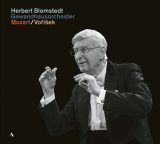Herbert Blomstedt dirigiert auf dieser CD zunächst eine im ersten Satz bedeutungsvoll rhetorische Prager Symphonie. Ein lyrisch gespieltes Andante führt zum alerten Presto. Die Tempi sind eher auf der langsamen Seite, der Klang ist groß dimensioniert und eine etwas dröhnende Pauke beeinträchtigt das Hörvergnügen einer Aufnahme, die eher routinierte wirkt als wirklich inspiriert.
Das zweite Werk auf dieser CD ist die Symphonie in D-Dur von Jan Vaclav Vorisek. 1791 in Böhmen geboren, kam dieser früh nach Wien und wurde 1818 Dirigent bei der Gesellschaft der Musikfreunde. Er starb 34-jährig an Lungentuberkulose. Die 1823, also zwei Jahre vor dem allzu frühen Tod des Komponisten entstandene Symphonie ist noch klassisch in der Form, enthält aber bereits Merkmale der Romantik. Es gibt viele Aufnahmen von dieser Symphonie, einige haben einen ausgesprochen tschechischen Charakter, andere und darunter auch die von Blomstedt betonen mehr die Nähe zu Schubert oder auch Beethoven.
In einer insgesamt sehr klassisch geformten Interpretation gelingt Blomstedt vor allem das gefühlvoll dirigierte Andante.
Herbert Blomstedt first conducts a Prague Symphony that is meaningfully rhetorical in the first movement on this CD. A lyrically played Andante leads to the alert Presto. Tempi are more on the slow side, the sound is broad, and a somewhat droning timpani detracts from the listening pleasure of a recording that seems more rote than truly inspired.
The second work on this CD is the Symphony in D Major by Jan Vaclav Vorisek. Born in Bohemia in 1791, the latter came to Vienna at an early age and became a conductor with the Gesellschaft der Musikfreunde in 1818. He died of pulmonary tuberculosis at the age of 34. Written in 1823, two years before the composer’s all-too-early death, the symphony is still classical in form, but already contains features of Romanticism. There are many recordings of this symphony, some having a distinctly Czech character, others and among them Blomstedt’s emphasize more the closeness to Schubert or even Beethoven.
In an overall very classically shaped interpretation, Blomstedt succeeds especially in the soulfully conducted Andante.






















